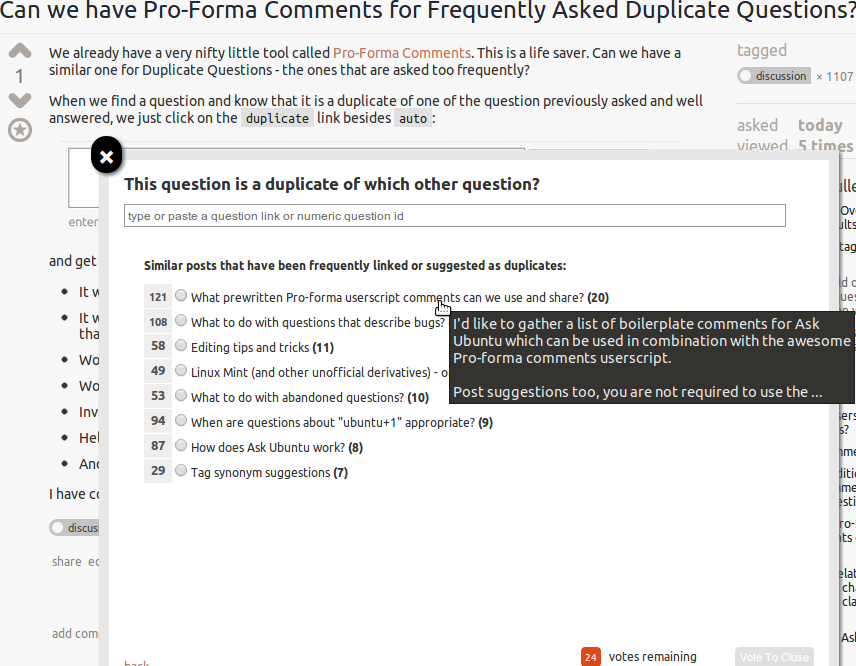Pro-forma comments are a userscript; anyone (who knows how) can implement another user script that does what you propose. Just as pro-forma comments are not actually part of the official Stack Exchange interface, a userscript could add this functionality.
###But this feature should not be implemented. At least not as described.
But this feature should not be implemented. At least not as described.
Questions aren't marked as duplicates by commenting. They are marked as duplicates by flagging or voting to close as a duplicate. Comments are secondary; they don't lead to closure, except insofar as someone may see the comment, decide they agree, and flag or vote.
Flagging or voting to close as a duplicate is not about what duplicates are available. It's about the question itself. Questions shouldn't be stretched to be duplicates of others. If you have to look through a general master list to know what question something is a duplicate of, you probably don't know it's a duplicate at all.
If you suspect a question is a duplicate and you go to flag or close it as one, you get a short list of similar-looking suggestions (this is separate from the very useful, usually longer list Jorge Castro has described). These suggestions indicate how many questions have been closed as duplicates of them:

This appears when voting to close or (for users with less than 2000 reputation) when flagging as a duplicate. When it doesn't appear--as sometimes happens--this means the system was not able to identify any questions that looked like good candidates for duping.
The question listed first, with the most questions closed as duplicates, is not necessarily the best one. For example, this meta question is not a duplicate of the question where pro-forma userscript comments are shared.
But the same problem would happen if there were a short list of common dupe masters. That one would appear, and people would comment saying this was a duplicate of it.
The necessary thoughtfulness for selecting an appropriate duplicate would make a single short master list, giving the same selections for every possible duplicate, not appropriate in most circumstances.
Many duplicates are duplicates of the questions you listed. Most are not.
###Comments are only useful once you know what to dupe the question to.
Comments are only useful once you know what to dupe the question to.
A master list on meta makes sense; a userscript for commenting doesn't. There is a small set of common reasons why answers tend to be NAA (not an answer). They all relate to people not understanding how this site is different from a forum.
In a sense, almost all NAA answers are NAA for the same reason.
In contrast, there are as many possible dupe targets as there are open questions on the site (plus some closed questions; sometimes a question is a duplicate of something that's closed as off-topic or not constructive).
Of course, there are other uses for pro-forma comments; for example, there are a few common ways answers can use improvement, even if they're real answers. These ways also all have to do with how Stack Exchange sites differ from forums.
